人教版九年级下册Unit 14I remember meeting all of you in Grade 7 Section A(Grammar Focus-4b)课件(共73张PPT,内嵌音频)
文档属性
| 名称 | 人教版九年级下册Unit 14I remember meeting all of you in Grade 7 Section A(Grammar Focus-4b)课件(共73张PPT,内嵌音频) |
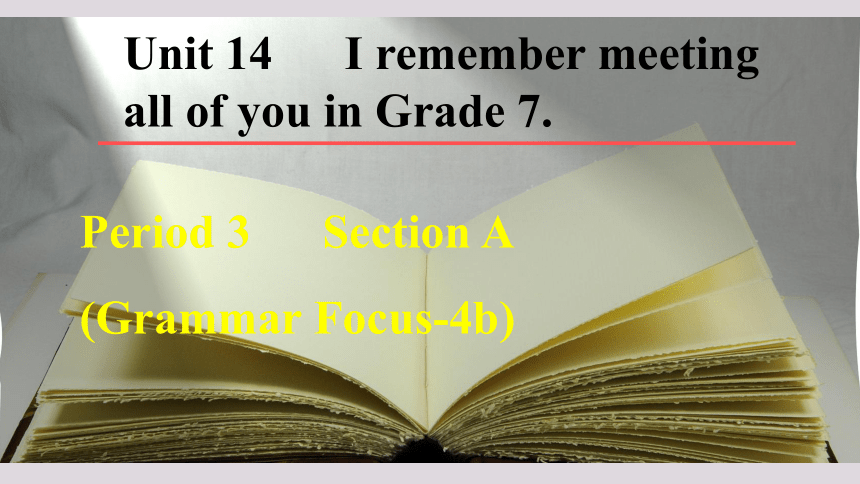
|
|
| 格式 | pptx | ||
| 文件大小 | 40.8MB | ||
| 资源类型 | 教案 | ||
| 版本资源 | 人教新目标(Go for it)版 | ||
| 科目 | 英语 | ||
| 更新时间 | 2025-02-05 00:00:00 | ||
图片预览



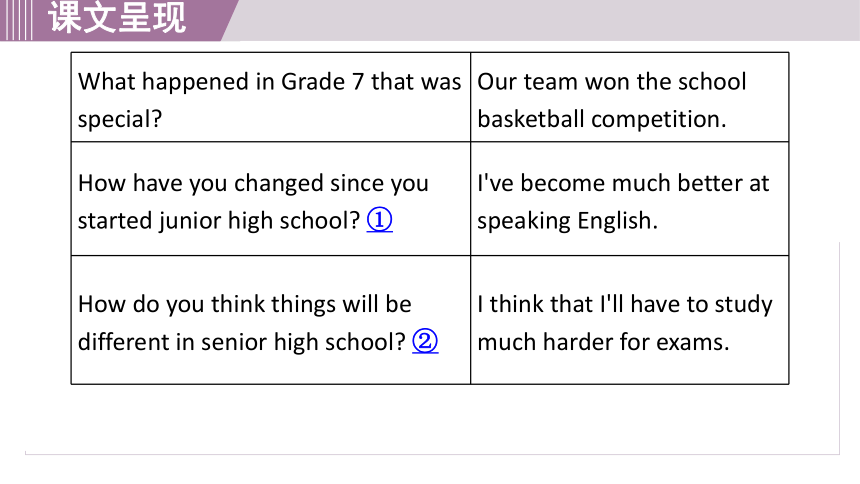
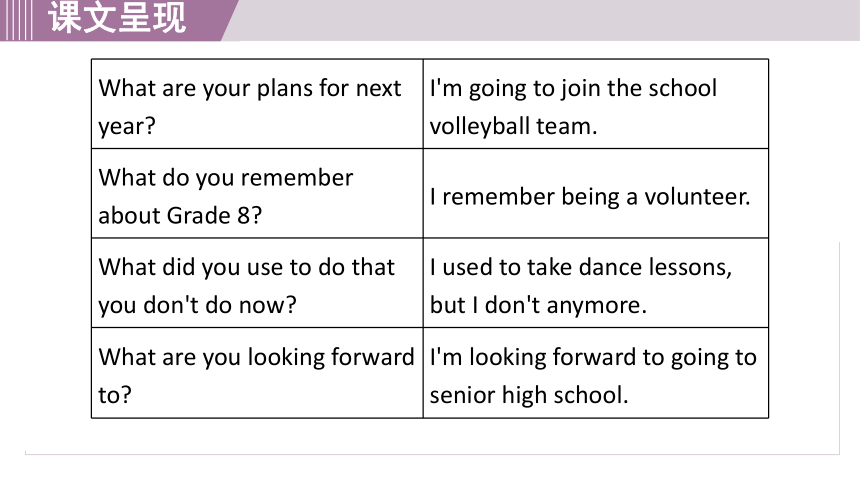
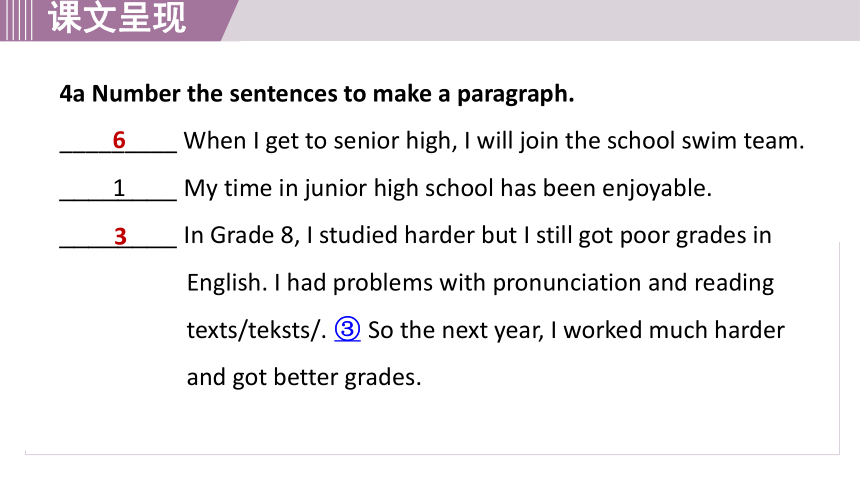
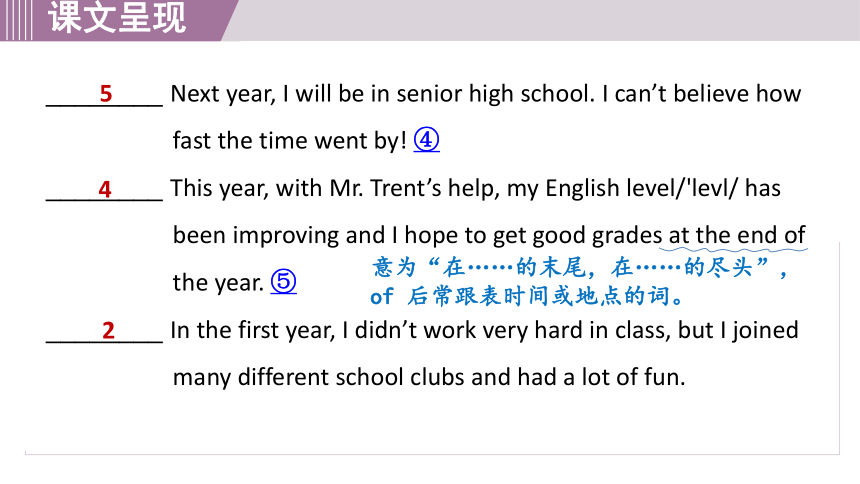

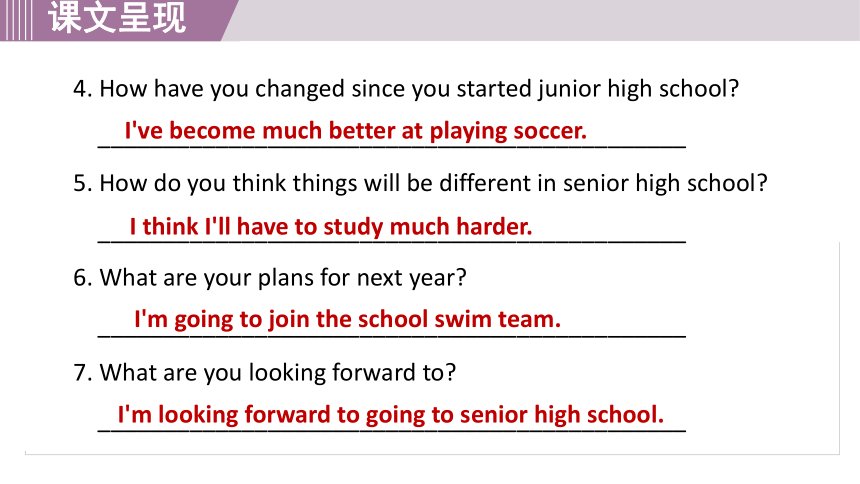
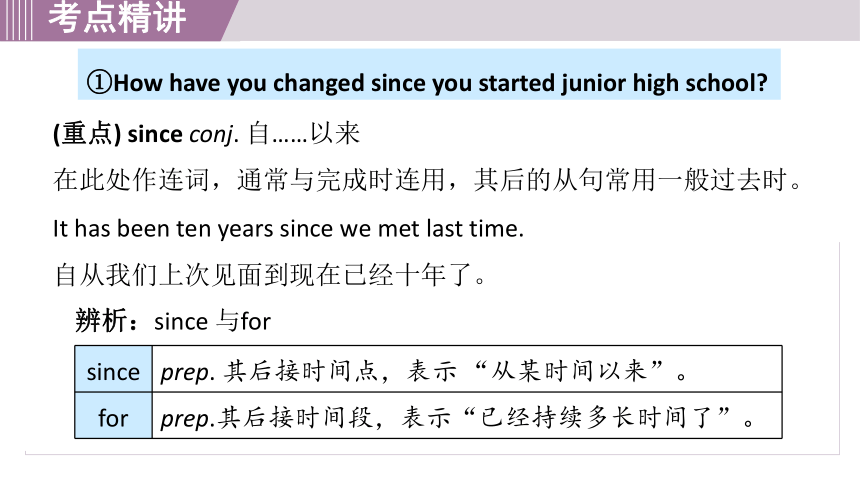
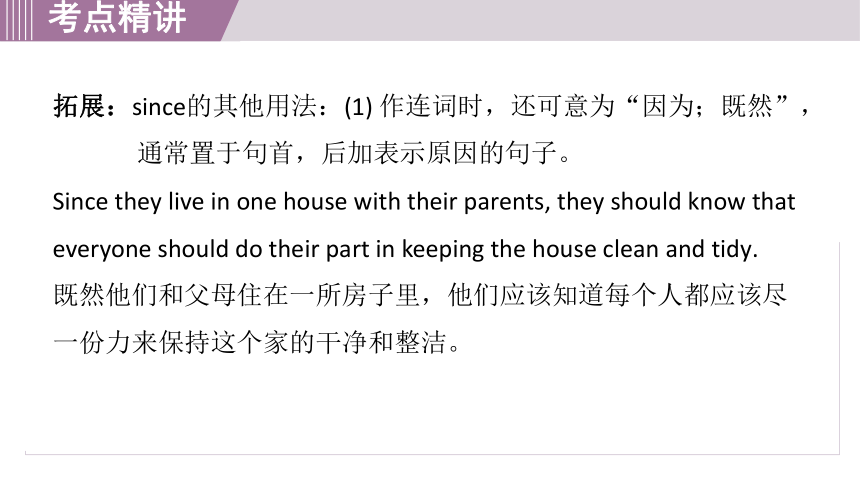
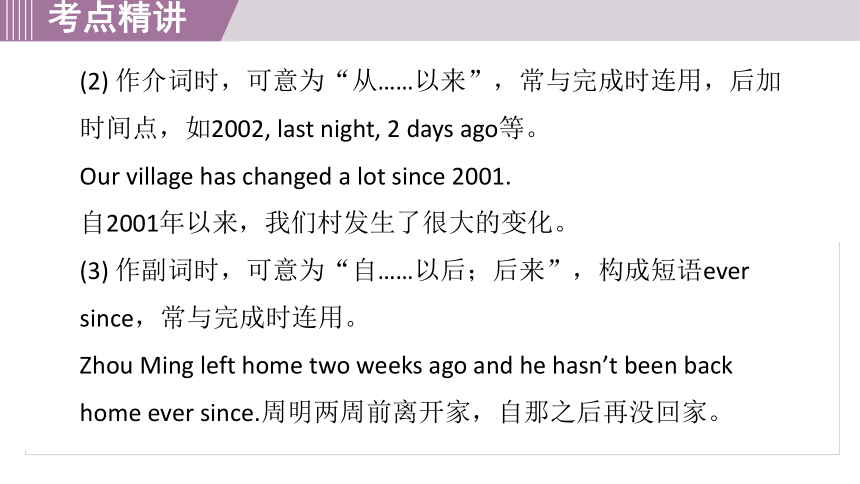
文档简介
(共73张PPT)
Period 3 Section A (Grammar Focus-4b)
Unit 14 I remember meeting all of you in Grade 7.
同学们, 上一课学习的单词、短语和句型, 你们都掌握了吗?现在大家来检验一下, 点击下面的音频开始听写吧!
Look at the following three sentences and talk about their differences:
①They play basketball every day.
②They played basketball yesterday.
③They will play basketball tomorrow.
What happened in Grade 7 that was special Our team won the school basketball competition.
How have you changed since you started junior high school ① I've become much better at speaking English.
How do you think things will be different in senior high school ② I think that I'll have to study much harder for exams.
What are your plans for next year I'm going to join the school volleyball team.
What do you remember about Grade 8 I remember being a volunteer.
What did you use to do that you don't do now I used to take dance lessons, but I don't anymore.
What are you looking forward to I'm looking forward to going to senior high school.
4a Number the sentences to make a paragraph.
_________ When I get to senior high, I will join the school swim team.
________ My time in junior high school has been enjoyable.
________ In Grade 8, I studied harder but I still got poor grades in English. I had problems with pronunciation and reading texts/teksts/. ③ So the next year, I worked much harder and got better grades.
1
6
3
________ Next year, I will be in senior high school. I can’t believe how fast the time went by! ④
________ This year, with Mr. Trent’s help, my English level/'levl/ has been improving and I hope to get good grades at the end of the year. ⑤
________ In the first year, I didn’t work very hard in class, but I joined many different school clubs and had a lot of fun.
5
4
2
意为“在……的末尾,在……的尽头”,
of 后常跟表时间或地点的词。
4b Write your own answers to the questions.
1. What do you remember about Grade 7
___________________________________________
2. What happened in Grade 8 that was special
___________________________________________
___________________________________________
3. What did you use to do that you don't do now
___________________________________________
I remember joining the English club in Grade 7.
My math was not good. With the help of my friend I got good grades.
I used to ask my teacher for help.
4. How have you changed since you started junior high school
_____________________________________________
5. How do you think things will be different in senior high school
_____________________________________________
6. What are your plans for next year
_____________________________________________
7. What are you looking forward to
_____________________________________________
I've become much better at playing soccer.
I think I'll have to study much harder.
I'm going to join the school swim team.
I'm looking forward to going to senior high school.
①How have you changed since you started junior high school
(重点) since conj. 自……以来
在此处作连词,通常与完成时连用,其后的从句常用一般过去时。
It has been ten years since we met last time.
自从我们上次见面到现在已经十年了。
辨析:since 与for
since prep. 其后接时间点,表示 “从某时间以来”。
for prep.其后接时间段,表示“已经持续多长时间了”。
拓展:since的其他用法:(1) 作连词时,还可意为“因为;既然”,通常置于句首,后加表示原因的句子。
Since they live in one house with their parents, they should know that everyone should do their part in keeping the house clean and tidy.
既然他们和父母住在一所房子里,他们应该知道每个人都应该尽一份力来保持这个家的干净和整洁。
(2) 作介词时,可意为“从……以来”,常与完成时连用,后加时间点,如2002, last night, 2 days ago等。
Our village has changed a lot since 2001.
自2001年以来,我们村发生了很大的变化。
(3) 作副词时,可意为“自……以后;后来”,构成短语ever since,常与完成时连用。
Zhou Ming left home two weeks ago and he hasn’t been back home ever since.周明两周前离开家,自那之后再没回家。
考题1:With the teachers’ help, we have greatly improved ourselves s we entered junior high school three years ago.
ince
【点拨】分析句子可知,主句是现在完成时,从句是一般过去时,所以此处应用since引导时间状语从句。
返回
温馨提示:可返回原文
考题2:—Do you know anything about One Belt One Road
—Yes, it _____ over 10 years since it started.
A.was B.had been
C.is D.has been
【点拨】根据“it... over 10 years since it started”可知,此处强调时间的延续,是“现在完成时+ since +一般过去时”结构。
D
②How do you think things will be different in senior high school
senior /'si ni (r) / adj. 级别(或地位) 高的
senior 作形容词, 意为“级别(或地位) 高的”, 与其对应的词是 junior, 意为“级别(或地位低) 的”。
His father is a senior engineer.
他的父亲是一位高级工程师。
senior 和junior 都是形容词,但它们都没有比较级和最高级。
拓展:(1) senior 作形容词,还可以表示“年长的;年纪大的”,在句中只能作定语。
Senior brothers should look after their little sisters well.
年长的哥哥们应当照顾好他们的小妹妹们。
John is several years senior to Rose. 约翰比罗丝年长几岁。
be senior to... 是一个固定搭配,意为“比……年长”。to 是介词,不能用than 来代替。
(2) senior 还可作名词,意为“毕业班学生”。
Next year, Jack will be a senior in junior high.
明年,杰克将成为初中的毕业班学生。
senior high (school) 高中 junior high (school) 初中
考题3:我期待着两个月后上高中。
I’m looking forward to going to s high school in two months.
返回
enior
③I had problems with pronunciation and reading texts.
have problems with sth. 在某方面有困难
I have problems with my English sometimes.
有时我在英语方面有困难。
在这个搭配中 trouble 和 difficulty是不可数名词。
拓展: (1) have problems/trouble/difficulty (in) doing sth.
做某事有困难
We had some problems/difficulty/trouble getting to the top of the mountain. 到达这个山顶我们有些困难。
(2) have no problem /trouble/difficulty (in) doing sth. 做某事毫不费力
She has no problem/difficulty/trouble in completing the task on time.
按时完成这项任务,她没有问题。
考题4:当我学习上遇到困难时,我常常向我的老师求助。
I often ask my teacher for help when I _____________________________________.
返回
have problems with my study
④I can’t believe how fast the time went by!
go by (时间) 逝去;过去
Ten years has gone by since I came to this school.
自从我来到这所学校, 已经过去十年了。
拓展:go by 还可意为“经过……;从……旁边经过”。
Miss Yang was playing the piano when we went by her window.
当我们经过她的窗前时,杨老师正在弹钢琴。
与go 有关的短语还有:
go ahead 前进;进行
go back to 返回;追溯到
go over 检查
go on 继续
go along with sb.和某人观点一致
go off(警报器等) 突然发出巨响
go out 外出
考题5:In such cheerful conversation, the time _____ quickly.
A. went up B. went down
C. went by D. went off
【点拨】用短语辨析法解题。went up 上升;went down 倒下;went by(时间) 逝去;went off 突然发出巨响。根据句意可知,表达时间流逝得快。
返回
C
⑤This year, with Mr. Trent’s help, my English level has been improving and I hope to get good grades at the end of the year.
level /'levl/ n. 水平
Working as a pilot requires a great deal of experience, a high level of skills and the ability to exactly follow test rules and report the result. 作为一名飞行员需要大量的经验,高水平的技能,以及准确地遵守测试规则并报告结果的能力。
拓展:level 还可意为“(与地面或过去位置相对的) 高度”。
Melting ice can cause the sea level to rise.
融化的冰会导致海平面上升。
level 作“水平”讲时,既可作可数名词,也可作不可数名词。high/low level“高/低水平”。
level 的常用搭配:sea level 海平面
water level水平;水位;水准
考题6:—Xiao Wen, I heard you went to Harbin the other day. Did you enjoy yourself there
—Of course. I like the Ice and Snow World and its high l of service.
返回
evel
一般现在时
一般 现在时 基本 结构 主语+be(am/is/are) + 其他①
主语+ 动词原形/ 第三人称单数+ 其他②
基本 用法 表示经常发生或习惯性的动作或状态③
表示现在的特征、状态、能力、性格等④
描述客观真理⑤
表示按计划、安排要发生的动作⑥
标志词 often, usually, always, sometimes, once a week 等⑦
1 I am an English teacher.
我是一位英语教师。
返回
2 The students play football after school.
学生们放学后踢足球。
The Great Wall looks really grand.
长城看上去真壮观。
拓展:动词第三人称单数形式的变化规则:
规则 例词
一般的动词直接在词尾加-s play—plays
以辅音字母加-y 结尾的动 词,先变y 为i 再加-es study—studies
worry—worries
以s, sh, ch, x 等结尾的动词, 在词尾加-es watch—watches
以o 结尾的动词一般加-es do—does go—goes
特殊变化 have—has
返回
3 Mary always helps her mother with housework.
玛丽总是帮助她的妈妈做家务。
4 He is eleven years old. 他11 岁了。
返回
5 The earth moves around the sun.
地球绕着太阳转。
考题1: A journey of a thousand miles _________ (begin) with the first step.
【点拨】句意:千里之行,始于足下。begin“开始”,动词,此处是一个习语,句子用一般现在时,主语是单数,动词用第三人称单数形式。
begins
返回
6 The train leaves at 9 o’clock.
火车于九点离开。
返回
7 She always gets up at 6 a.m. to go for a run.
她总是早上六点起床去跑步。
—How often does your teacher exercise
你的老师多久锻炼一次?
—Twice a week. 一周两次。
考题2: A lot of people in China ______ by high-speed train every year.
A. travel B. traveled
C. will travel D. have traveled
【点拨】句意:中国每年有很多人乘坐高铁出行。考查动词的时态。根据时间状语“every year”可知,本句应用一般现在时。
A
特别提醒:如果主句是一般将来时,在时间状语从句和条件状语从句中,常使用一般现在时表示将来。
If it doesn’t rain tomorrow, we’ll visit our old teachers.
如果明天不下雨,我们就去看望我们的老教师们。
(条件状语从句)
She will call you as soon as she gets home.
她一到家就会给你打电话。(时间状语从句)
考题3: He ______ much healthier if he ______ enough exercise in his free time.
A. is; take B. will be; takes
C. will be; take
【点拨】此句是含有if引导的条件状语从句的主从复合句,遵循“主将从现”原则,主句用一般将来时,从句用一般现在时。从句主语是he,谓语动词用三单形式。
B
返回
一般过去时
一般 过去时 基本结构 主语+ be (was/were) +其他①
主语+ 动词过去式+ 其他②
基本用法 表示过去发生的事情或存在的状态③
表示过去反复发生的动作④
标志词 表示过去的时间状语yesterday, last year, in 1990, 7 days ago, just now等⑤
1 I was very tired yesterday. 我昨天很累。
返回
2 We often played together when we were children.
我们是孩子时,我们经常在一起玩。
拓展:(1) 动词的过去式变化规则如下:
规则 例词
一般的动词直接在词尾加-ed。 want—wanted
work—worked
以不发音的e结尾的动词在词尾加-d。 move—moved
smile—smiled
hope—hoped
规则 例词
以辅音字母加-y结尾的动词,先把y变成i,再加-ed。 study—studied
carry—carried
hurry—hurried
marry—married
worry—worried
以一个元音字母加一个辅音字母结尾的重读闭音节动词,先双写结尾的辅音字母,再加-ed。 stop—stopped
plan—planned
Suddenly, the clouds cleared and the rain stopped.
突然,云开雨停。
Without eating anything, the boss hurried off to catch the train.
老板什么也没吃就匆匆去赶火车了。
These factories stopped because of pollution.
因为污染,这些厂子停产了。
考题4:Elena __________ (drop) the novel she was reading on the desk and looked out the window.
【点拨】drop“使落下”,动词。根据“and looked”可知,时态是一般过去时,谓语动词用其过去式。
dropped
(2) 不规则动词(Irregular Verbs) 的过去式有以下几种:
规律 例词
过去式与原形相同。 put—put let—let cut—cut
beat—beat
把结尾的d 变成t。 build—built lend—lent
send—sent spend—spent
以n 结尾的词, 在词后加t。 mean—meant burn—burnt
learn—learnt
规律 例词
以ow / aw 结尾的词,把ow / aw 变成ew。 blow—blew draw—drew
know—knew
grow—grew throw—threw
(动词show 除外,show—showed)
含有双写字母的词,将双写改为单写,并在词尾加t。 keep—kept sleep—slept feel—felt
smell—smelt sweep—swept
bring—brought,buy— bought,think—thought,catch—caught,teach—taught 特别提醒: 还有很多不符合上述规律的动词过去式,需要大家特殊记忆。
返回
3 I went home at ten o’clock the day before yesterday.
我前天十点回家。
4 My mother often went home on foot last year.
去年我的母亲经常步行回家。
返回
5 Lu Xun returned to China in 1909 and worked as a teacher and writer.
鲁迅1909 年回国并当起了老师兼作家。
He played basketball for a whole afternoon yesterday.
他昨天打了一下午篮球。
考题5:—What did you do last Saturday, Tina
—I _____ to the nursing home and worked as a volunteer there.
A. go B. went
C. will go D. was going
【点拨】根据“last Saturday”可知,句子使用一般过去时,谓语动词用过去式。
B
返回
一般将来时
一般 将来时 基本结构 主语+ will + 动词原形(包括be 动词) ①
主语+ be going to + 动词原形②
基本用法 表示将要发生的动作或存在的状态③
表示说话人的意图、打算或某种可能性,此时多用“be going to +动词原形”结构④
标志词 表示将来的时间状语tomorrow,next week,in 2050,in the future 等⑤
1 Probably people will live on Mars in the future.
或许将来人们将在火星上生活。
特别提醒:
其一般疑问句形式把助动词will 提前即可:
—Will people probably live on Mars in the future
—Yes, they will./No, they won’
返回
2 They are going to hike to the top of the mountain.
他们打算徒步到山顶。
返回
3 Good news! Our school will set up a new music club.
好消息!我们学校将创办一个新的音乐俱乐部。
考题6:I ______ ice skating this Sunday. Do you want to come
A. go B. went
C. was going D. will go
【点拨】根据“Do you want to come ”可知动作还未发生,用一般将来时。
D
返回
4 He is going to the park to skate.
他打算去公园滑冰。
考题7:—Jane and I ______ a picnic this Sunday. Would you like to come with us
—Sure. See you then.
A. had B. have had
C. were having D. are going to have
【点拨】根据句意可知,这个星期天要去野餐,事情发生在将来,时态是一般将来时,结构是will do或be going to do。
D
返回
5 It will be my father’s birthday next Saturday.
下星期六是我父亲的生日。
拓展: (1) There will be +主语+其他将会有……
There will be a concert next Saturday.
下周六将有一场音乐会。
考题8:—Oh, no! Your brother left his umbrella at home. There ______ heavy rain this afternoon.
—Don’t worry, Mom. I’ll bring it to him.
A.was B.has been
C.are D.will be
【点拨】句意:—哦,不!你哥哥把他的伞落在家里了。今天下午会有大雨。—别担心,妈妈。我会拿给他的。考查动词时态。根据“this afternoon”可知是一般将来时。
D
(2) There is/ are going to be... 将会有……
There is going to be a football match between Class One and us next Saturday. 下周六我们和一班将会有一场足球赛。
(3) be + doing 将要做……
Mr. Ye is leaving for Oxford University to give a speech on traditional Chinese culture tomorrow.
明天叶先生将动身去牛津大学做关于中国传统文化的演讲。
特别提醒:“will +动词原形”表示没有经过计划临时做出的决定,伴有说话人的主观意志。“be going to”则表示计划、打算要做的事或有迹象表明要发生的事情。
I hope it will be sunny tomorrow. 我希望明天天气晴朗。
We are going to visit Shanghai. 我们打算去游览上海。
返回
宾语从句
宾 语 从 句 概述 在复合句中作宾语的从句叫作宾语从句。
引导词 that, if, whether, who, what, where, why 和how 等。①
语序 在含有宾语从句的主从复合句中,从句一律用陈述语序。②
时态 主句是一般现在时,从句根据实际情况可以使用任何时态。③
主句是一般过去时,从句常用过去的某种时态。④
1 宾语从句的引导词
引导词 引导词在从句中的作用
that 本身无具体意义,只起连接作用,在从句中不充当任何成分。在口语或非正式文体中常省略。
if 或 whether 意为“是否”,起连接作用。一般情况下,两者可以互换。如果与or not 连用或者位于介词之后,只能用whether。
疑问词(组) 有具体的意义,在从句中充当相应的成分。
I think that mooncakes are delicious! 我认为月饼很好吃。
I don’t know if it is going to rain. 我不知道是否会下雨。
I don’t know whether Uncle Wang will
come or not. 我不知道王叔叔是否会来。
Can you tell me what you saw just now
你能告诉我你刚才看到了什么吗?
考题9:—Could you tell us ______ we can start a conversation with a foreigner
—Talking about weather is a good choice.
A.how B.whether
C.why D.when
A
返回
2 We don’t know where he comes from.
我们不知道他从哪里来。
Could you tell me where students’ centre is
你能告诉我学生中心在哪里吗?
考题10:The saying “Knowledge starts with practice” tells us ______.
A.what is knowledge
B.how we can get knowledge
C.why is practice powerful
D.when we should start practicing
B
返回
3 Do you remember what you had today
你记得你今天吃了什么吗?
返回
4 She asked me if I had finished my homework yesterday.
昨天她问我是否完成了我的家庭作业。
考题11:Hey, Aunt Jenny! It’s you! I didn’t expect you ______ over. What a nice surprise!
A.has come B.have come
C.would come D.will come
【点拨】由“didn’t expect”可知,主句时态是一般过去时,则从句也应为过去的某种时态。
C
特别提醒: 当宾语从句表示的是客观真理、自然现象或者事实时,不管主句是什么时态,从句都要用一般现在时。
The teacher told us (that) the earth goes around the sun.
老师告诉我们地球绕着太阳转。
返回
本节课主要复习了一般现在时、一般过去时、一般将来时。
Period 3 Section A (Grammar Focus-4b)
Unit 14 I remember meeting all of you in Grade 7.
同学们, 上一课学习的单词、短语和句型, 你们都掌握了吗?现在大家来检验一下, 点击下面的音频开始听写吧!
Look at the following three sentences and talk about their differences:
①They play basketball every day.
②They played basketball yesterday.
③They will play basketball tomorrow.
What happened in Grade 7 that was special Our team won the school basketball competition.
How have you changed since you started junior high school ① I've become much better at speaking English.
How do you think things will be different in senior high school ② I think that I'll have to study much harder for exams.
What are your plans for next year I'm going to join the school volleyball team.
What do you remember about Grade 8 I remember being a volunteer.
What did you use to do that you don't do now I used to take dance lessons, but I don't anymore.
What are you looking forward to I'm looking forward to going to senior high school.
4a Number the sentences to make a paragraph.
_________ When I get to senior high, I will join the school swim team.
________ My time in junior high school has been enjoyable.
________ In Grade 8, I studied harder but I still got poor grades in English. I had problems with pronunciation and reading texts/teksts/. ③ So the next year, I worked much harder and got better grades.
1
6
3
________ Next year, I will be in senior high school. I can’t believe how fast the time went by! ④
________ This year, with Mr. Trent’s help, my English level/'levl/ has been improving and I hope to get good grades at the end of the year. ⑤
________ In the first year, I didn’t work very hard in class, but I joined many different school clubs and had a lot of fun.
5
4
2
意为“在……的末尾,在……的尽头”,
of 后常跟表时间或地点的词。
4b Write your own answers to the questions.
1. What do you remember about Grade 7
___________________________________________
2. What happened in Grade 8 that was special
___________________________________________
___________________________________________
3. What did you use to do that you don't do now
___________________________________________
I remember joining the English club in Grade 7.
My math was not good. With the help of my friend I got good grades.
I used to ask my teacher for help.
4. How have you changed since you started junior high school
_____________________________________________
5. How do you think things will be different in senior high school
_____________________________________________
6. What are your plans for next year
_____________________________________________
7. What are you looking forward to
_____________________________________________
I've become much better at playing soccer.
I think I'll have to study much harder.
I'm going to join the school swim team.
I'm looking forward to going to senior high school.
①How have you changed since you started junior high school
(重点) since conj. 自……以来
在此处作连词,通常与完成时连用,其后的从句常用一般过去时。
It has been ten years since we met last time.
自从我们上次见面到现在已经十年了。
辨析:since 与for
since prep. 其后接时间点,表示 “从某时间以来”。
for prep.其后接时间段,表示“已经持续多长时间了”。
拓展:since的其他用法:(1) 作连词时,还可意为“因为;既然”,通常置于句首,后加表示原因的句子。
Since they live in one house with their parents, they should know that everyone should do their part in keeping the house clean and tidy.
既然他们和父母住在一所房子里,他们应该知道每个人都应该尽一份力来保持这个家的干净和整洁。
(2) 作介词时,可意为“从……以来”,常与完成时连用,后加时间点,如2002, last night, 2 days ago等。
Our village has changed a lot since 2001.
自2001年以来,我们村发生了很大的变化。
(3) 作副词时,可意为“自……以后;后来”,构成短语ever since,常与完成时连用。
Zhou Ming left home two weeks ago and he hasn’t been back home ever since.周明两周前离开家,自那之后再没回家。
考题1:With the teachers’ help, we have greatly improved ourselves s we entered junior high school three years ago.
ince
【点拨】分析句子可知,主句是现在完成时,从句是一般过去时,所以此处应用since引导时间状语从句。
返回
温馨提示:可返回原文
考题2:—Do you know anything about One Belt One Road
—Yes, it _____ over 10 years since it started.
A.was B.had been
C.is D.has been
【点拨】根据“it... over 10 years since it started”可知,此处强调时间的延续,是“现在完成时+ since +一般过去时”结构。
D
②How do you think things will be different in senior high school
senior /'si ni (r) / adj. 级别(或地位) 高的
senior 作形容词, 意为“级别(或地位) 高的”, 与其对应的词是 junior, 意为“级别(或地位低) 的”。
His father is a senior engineer.
他的父亲是一位高级工程师。
senior 和junior 都是形容词,但它们都没有比较级和最高级。
拓展:(1) senior 作形容词,还可以表示“年长的;年纪大的”,在句中只能作定语。
Senior brothers should look after their little sisters well.
年长的哥哥们应当照顾好他们的小妹妹们。
John is several years senior to Rose. 约翰比罗丝年长几岁。
be senior to... 是一个固定搭配,意为“比……年长”。to 是介词,不能用than 来代替。
(2) senior 还可作名词,意为“毕业班学生”。
Next year, Jack will be a senior in junior high.
明年,杰克将成为初中的毕业班学生。
senior high (school) 高中 junior high (school) 初中
考题3:我期待着两个月后上高中。
I’m looking forward to going to s high school in two months.
返回
enior
③I had problems with pronunciation and reading texts.
have problems with sth. 在某方面有困难
I have problems with my English sometimes.
有时我在英语方面有困难。
在这个搭配中 trouble 和 difficulty是不可数名词。
拓展: (1) have problems/trouble/difficulty (in) doing sth.
做某事有困难
We had some problems/difficulty/trouble getting to the top of the mountain. 到达这个山顶我们有些困难。
(2) have no problem /trouble/difficulty (in) doing sth. 做某事毫不费力
She has no problem/difficulty/trouble in completing the task on time.
按时完成这项任务,她没有问题。
考题4:当我学习上遇到困难时,我常常向我的老师求助。
I often ask my teacher for help when I _____________________________________.
返回
have problems with my study
④I can’t believe how fast the time went by!
go by (时间) 逝去;过去
Ten years has gone by since I came to this school.
自从我来到这所学校, 已经过去十年了。
拓展:go by 还可意为“经过……;从……旁边经过”。
Miss Yang was playing the piano when we went by her window.
当我们经过她的窗前时,杨老师正在弹钢琴。
与go 有关的短语还有:
go ahead 前进;进行
go back to 返回;追溯到
go over 检查
go on 继续
go along with sb.和某人观点一致
go off(警报器等) 突然发出巨响
go out 外出
考题5:In such cheerful conversation, the time _____ quickly.
A. went up B. went down
C. went by D. went off
【点拨】用短语辨析法解题。went up 上升;went down 倒下;went by(时间) 逝去;went off 突然发出巨响。根据句意可知,表达时间流逝得快。
返回
C
⑤This year, with Mr. Trent’s help, my English level has been improving and I hope to get good grades at the end of the year.
level /'levl/ n. 水平
Working as a pilot requires a great deal of experience, a high level of skills and the ability to exactly follow test rules and report the result. 作为一名飞行员需要大量的经验,高水平的技能,以及准确地遵守测试规则并报告结果的能力。
拓展:level 还可意为“(与地面或过去位置相对的) 高度”。
Melting ice can cause the sea level to rise.
融化的冰会导致海平面上升。
level 作“水平”讲时,既可作可数名词,也可作不可数名词。high/low level“高/低水平”。
level 的常用搭配:sea level 海平面
water level水平;水位;水准
考题6:—Xiao Wen, I heard you went to Harbin the other day. Did you enjoy yourself there
—Of course. I like the Ice and Snow World and its high l of service.
返回
evel
一般现在时
一般 现在时 基本 结构 主语+be(am/is/are) + 其他①
主语+ 动词原形/ 第三人称单数+ 其他②
基本 用法 表示经常发生或习惯性的动作或状态③
表示现在的特征、状态、能力、性格等④
描述客观真理⑤
表示按计划、安排要发生的动作⑥
标志词 often, usually, always, sometimes, once a week 等⑦
1 I am an English teacher.
我是一位英语教师。
返回
2 The students play football after school.
学生们放学后踢足球。
The Great Wall looks really grand.
长城看上去真壮观。
拓展:动词第三人称单数形式的变化规则:
规则 例词
一般的动词直接在词尾加-s play—plays
以辅音字母加-y 结尾的动 词,先变y 为i 再加-es study—studies
worry—worries
以s, sh, ch, x 等结尾的动词, 在词尾加-es watch—watches
以o 结尾的动词一般加-es do—does go—goes
特殊变化 have—has
返回
3 Mary always helps her mother with housework.
玛丽总是帮助她的妈妈做家务。
4 He is eleven years old. 他11 岁了。
返回
5 The earth moves around the sun.
地球绕着太阳转。
考题1: A journey of a thousand miles _________ (begin) with the first step.
【点拨】句意:千里之行,始于足下。begin“开始”,动词,此处是一个习语,句子用一般现在时,主语是单数,动词用第三人称单数形式。
begins
返回
6 The train leaves at 9 o’clock.
火车于九点离开。
返回
7 She always gets up at 6 a.m. to go for a run.
她总是早上六点起床去跑步。
—How often does your teacher exercise
你的老师多久锻炼一次?
—Twice a week. 一周两次。
考题2: A lot of people in China ______ by high-speed train every year.
A. travel B. traveled
C. will travel D. have traveled
【点拨】句意:中国每年有很多人乘坐高铁出行。考查动词的时态。根据时间状语“every year”可知,本句应用一般现在时。
A
特别提醒:如果主句是一般将来时,在时间状语从句和条件状语从句中,常使用一般现在时表示将来。
If it doesn’t rain tomorrow, we’ll visit our old teachers.
如果明天不下雨,我们就去看望我们的老教师们。
(条件状语从句)
She will call you as soon as she gets home.
她一到家就会给你打电话。(时间状语从句)
考题3: He ______ much healthier if he ______ enough exercise in his free time.
A. is; take B. will be; takes
C. will be; take
【点拨】此句是含有if引导的条件状语从句的主从复合句,遵循“主将从现”原则,主句用一般将来时,从句用一般现在时。从句主语是he,谓语动词用三单形式。
B
返回
一般过去时
一般 过去时 基本结构 主语+ be (was/were) +其他①
主语+ 动词过去式+ 其他②
基本用法 表示过去发生的事情或存在的状态③
表示过去反复发生的动作④
标志词 表示过去的时间状语yesterday, last year, in 1990, 7 days ago, just now等⑤
1 I was very tired yesterday. 我昨天很累。
返回
2 We often played together when we were children.
我们是孩子时,我们经常在一起玩。
拓展:(1) 动词的过去式变化规则如下:
规则 例词
一般的动词直接在词尾加-ed。 want—wanted
work—worked
以不发音的e结尾的动词在词尾加-d。 move—moved
smile—smiled
hope—hoped
规则 例词
以辅音字母加-y结尾的动词,先把y变成i,再加-ed。 study—studied
carry—carried
hurry—hurried
marry—married
worry—worried
以一个元音字母加一个辅音字母结尾的重读闭音节动词,先双写结尾的辅音字母,再加-ed。 stop—stopped
plan—planned
Suddenly, the clouds cleared and the rain stopped.
突然,云开雨停。
Without eating anything, the boss hurried off to catch the train.
老板什么也没吃就匆匆去赶火车了。
These factories stopped because of pollution.
因为污染,这些厂子停产了。
考题4:Elena __________ (drop) the novel she was reading on the desk and looked out the window.
【点拨】drop“使落下”,动词。根据“and looked”可知,时态是一般过去时,谓语动词用其过去式。
dropped
(2) 不规则动词(Irregular Verbs) 的过去式有以下几种:
规律 例词
过去式与原形相同。 put—put let—let cut—cut
beat—beat
把结尾的d 变成t。 build—built lend—lent
send—sent spend—spent
以n 结尾的词, 在词后加t。 mean—meant burn—burnt
learn—learnt
规律 例词
以ow / aw 结尾的词,把ow / aw 变成ew。 blow—blew draw—drew
know—knew
grow—grew throw—threw
(动词show 除外,show—showed)
含有双写字母的词,将双写改为单写,并在词尾加t。 keep—kept sleep—slept feel—felt
smell—smelt sweep—swept
bring—brought,buy— bought,think—thought,catch—caught,teach—taught 特别提醒: 还有很多不符合上述规律的动词过去式,需要大家特殊记忆。
返回
3 I went home at ten o’clock the day before yesterday.
我前天十点回家。
4 My mother often went home on foot last year.
去年我的母亲经常步行回家。
返回
5 Lu Xun returned to China in 1909 and worked as a teacher and writer.
鲁迅1909 年回国并当起了老师兼作家。
He played basketball for a whole afternoon yesterday.
他昨天打了一下午篮球。
考题5:—What did you do last Saturday, Tina
—I _____ to the nursing home and worked as a volunteer there.
A. go B. went
C. will go D. was going
【点拨】根据“last Saturday”可知,句子使用一般过去时,谓语动词用过去式。
B
返回
一般将来时
一般 将来时 基本结构 主语+ will + 动词原形(包括be 动词) ①
主语+ be going to + 动词原形②
基本用法 表示将要发生的动作或存在的状态③
表示说话人的意图、打算或某种可能性,此时多用“be going to +动词原形”结构④
标志词 表示将来的时间状语tomorrow,next week,in 2050,in the future 等⑤
1 Probably people will live on Mars in the future.
或许将来人们将在火星上生活。
特别提醒:
其一般疑问句形式把助动词will 提前即可:
—Will people probably live on Mars in the future
—Yes, they will./No, they won’
返回
2 They are going to hike to the top of the mountain.
他们打算徒步到山顶。
返回
3 Good news! Our school will set up a new music club.
好消息!我们学校将创办一个新的音乐俱乐部。
考题6:I ______ ice skating this Sunday. Do you want to come
A. go B. went
C. was going D. will go
【点拨】根据“Do you want to come ”可知动作还未发生,用一般将来时。
D
返回
4 He is going to the park to skate.
他打算去公园滑冰。
考题7:—Jane and I ______ a picnic this Sunday. Would you like to come with us
—Sure. See you then.
A. had B. have had
C. were having D. are going to have
【点拨】根据句意可知,这个星期天要去野餐,事情发生在将来,时态是一般将来时,结构是will do或be going to do。
D
返回
5 It will be my father’s birthday next Saturday.
下星期六是我父亲的生日。
拓展: (1) There will be +主语+其他将会有……
There will be a concert next Saturday.
下周六将有一场音乐会。
考题8:—Oh, no! Your brother left his umbrella at home. There ______ heavy rain this afternoon.
—Don’t worry, Mom. I’ll bring it to him.
A.was B.has been
C.are D.will be
【点拨】句意:—哦,不!你哥哥把他的伞落在家里了。今天下午会有大雨。—别担心,妈妈。我会拿给他的。考查动词时态。根据“this afternoon”可知是一般将来时。
D
(2) There is/ are going to be... 将会有……
There is going to be a football match between Class One and us next Saturday. 下周六我们和一班将会有一场足球赛。
(3) be + doing 将要做……
Mr. Ye is leaving for Oxford University to give a speech on traditional Chinese culture tomorrow.
明天叶先生将动身去牛津大学做关于中国传统文化的演讲。
特别提醒:“will +动词原形”表示没有经过计划临时做出的决定,伴有说话人的主观意志。“be going to”则表示计划、打算要做的事或有迹象表明要发生的事情。
I hope it will be sunny tomorrow. 我希望明天天气晴朗。
We are going to visit Shanghai. 我们打算去游览上海。
返回
宾语从句
宾 语 从 句 概述 在复合句中作宾语的从句叫作宾语从句。
引导词 that, if, whether, who, what, where, why 和how 等。①
语序 在含有宾语从句的主从复合句中,从句一律用陈述语序。②
时态 主句是一般现在时,从句根据实际情况可以使用任何时态。③
主句是一般过去时,从句常用过去的某种时态。④
1 宾语从句的引导词
引导词 引导词在从句中的作用
that 本身无具体意义,只起连接作用,在从句中不充当任何成分。在口语或非正式文体中常省略。
if 或 whether 意为“是否”,起连接作用。一般情况下,两者可以互换。如果与or not 连用或者位于介词之后,只能用whether。
疑问词(组) 有具体的意义,在从句中充当相应的成分。
I think that mooncakes are delicious! 我认为月饼很好吃。
I don’t know if it is going to rain. 我不知道是否会下雨。
I don’t know whether Uncle Wang will
come or not. 我不知道王叔叔是否会来。
Can you tell me what you saw just now
你能告诉我你刚才看到了什么吗?
考题9:—Could you tell us ______ we can start a conversation with a foreigner
—Talking about weather is a good choice.
A.how B.whether
C.why D.when
A
返回
2 We don’t know where he comes from.
我们不知道他从哪里来。
Could you tell me where students’ centre is
你能告诉我学生中心在哪里吗?
考题10:The saying “Knowledge starts with practice” tells us ______.
A.what is knowledge
B.how we can get knowledge
C.why is practice powerful
D.when we should start practicing
B
返回
3 Do you remember what you had today
你记得你今天吃了什么吗?
返回
4 She asked me if I had finished my homework yesterday.
昨天她问我是否完成了我的家庭作业。
考题11:Hey, Aunt Jenny! It’s you! I didn’t expect you ______ over. What a nice surprise!
A.has come B.have come
C.would come D.will come
【点拨】由“didn’t expect”可知,主句时态是一般过去时,则从句也应为过去的某种时态。
C
特别提醒: 当宾语从句表示的是客观真理、自然现象或者事实时,不管主句是什么时态,从句都要用一般现在时。
The teacher told us (that) the earth goes around the sun.
老师告诉我们地球绕着太阳转。
返回
本节课主要复习了一般现在时、一般过去时、一般将来时。
同课章节目录
- Unit 1 How can we become good learners.
- Section A
- Section B
- Unit 2 I think that mooncakes are delicious!
- Section A
- Section B
- Unit 3 Could you please tell me where the restroom
- Section A
- Section B
- Unit 4 I used to be afraid of the dark.
- Section A
- Section B
- Unit 5 What are the shirts made of?
- Section A
- Section B
- Review of Units 1-5
- Unit 6 When was it invented?
- Section A
- Section B
- Unit 7 Teenagers should be allowed to choose their
- Section A
- Section B
- Unit 8 It must belong to Carla.
- Section A
- Section B
- Unit 9 I like music that I can dance to.
- Section A
- Section B
- Unit 10 You're supposed to shake hands.
- Section A
- Section B
- Review of Units 6-10
- Unit 11 Sad movies make me cry.
- Section A
- Section B
- Unit 12 Life is full of the unexpected
- Section A
- Section B
- Unit 13 We're trying to save the earth!
- Section A
- Section B
- Unit 14 I remember meeting all of you in Grade 7.
- Section A
- Section B
- Review of Units 11-14
